5 Steps to Choose the Right Market Intelligence Platform

5 Steps to Choose the Right Market Intelligence Platform
Overview
The primary objective of this article is to offer a structured methodology for selecting the appropriate market intelligence platform. It outlines essential criteria and features that should be taken into account. Key factors highlighted include:
- Data integration
- Real-time analytics
- Usability
- Customer support
These elements are argued to be vital for ensuring that the platform effectively addresses business needs and enhances decision-making processes. By considering these criteria, organizations can make informed choices that significantly impact their operational efficiency.
Introduction
Choosing the right market intelligence platform can be a daunting task, particularly as businesses navigate an increasingly data-driven landscape. The right tools enable organizations to harness valuable insights that drive strategic decision-making and enhance competitive advantage. However, the challenge lies in identifying which features truly align with specific business needs and objectives.
What essential criteria should companies prioritize to ensure they select a platform that not only meets their current demands but also adapts to future challenges? By focusing on these criteria, organizations can ensure their investment in market intelligence is both strategic and future-proof.
Identify Essential Features of Market Intelligence Platforms
When selecting , it is crucial to identify key features that align with your business objectives. Consider the following essential features:
- Data Integration: The platform must seamlessly integrate with existing systems such as CRM and ERP. This integration ensures a smooth data flow across your organization, preserving information accuracy and consistency, which are foundational for effective decision-making. SavvyIQ's AI-driven APIs facilitate this integration, allowing companies to automate workflows and eliminate manual information tasks.
- Real-Time Analytics: Choose tools that provide real-time data analysis, enabling timely decisions that can significantly influence your business outcomes. Access to up-to-date insights, powered by SavvyIQ's Recursive Data Engine, empowers organizations to respond quickly to market changes and emerging trends, thereby enhancing their competitive edge.
- Accessible Interface: An intuitive interface is vital for boosting adoption and operational efficiency. When users can navigate the system effortlessly, they are more likely to engage with the information and utilize the service effectively.
- Customizable Dashboards: The ability to create dashboards tailored to specific metrics is essential for performance monitoring. Custom dashboards allow users to concentrate on the most relevant data, facilitating better insights and strategic planning.
- Collaboration Tools: Features that enhance teamwork and facilitate the sharing of insights among team members can significantly boost productivity. Effective collaboration tools enable teams to work together seamlessly, fostering a data-driven culture within the organization.
By concentrating on these attributes, particularly those offered by SavvyIQ, you can efficiently narrow down your options and select an intelligence solution that meets your needs. As the global business intelligence sector is expected to grow significantly, leveraging SavvyIQ's solutions is vital for maintaining a competitive advantage.
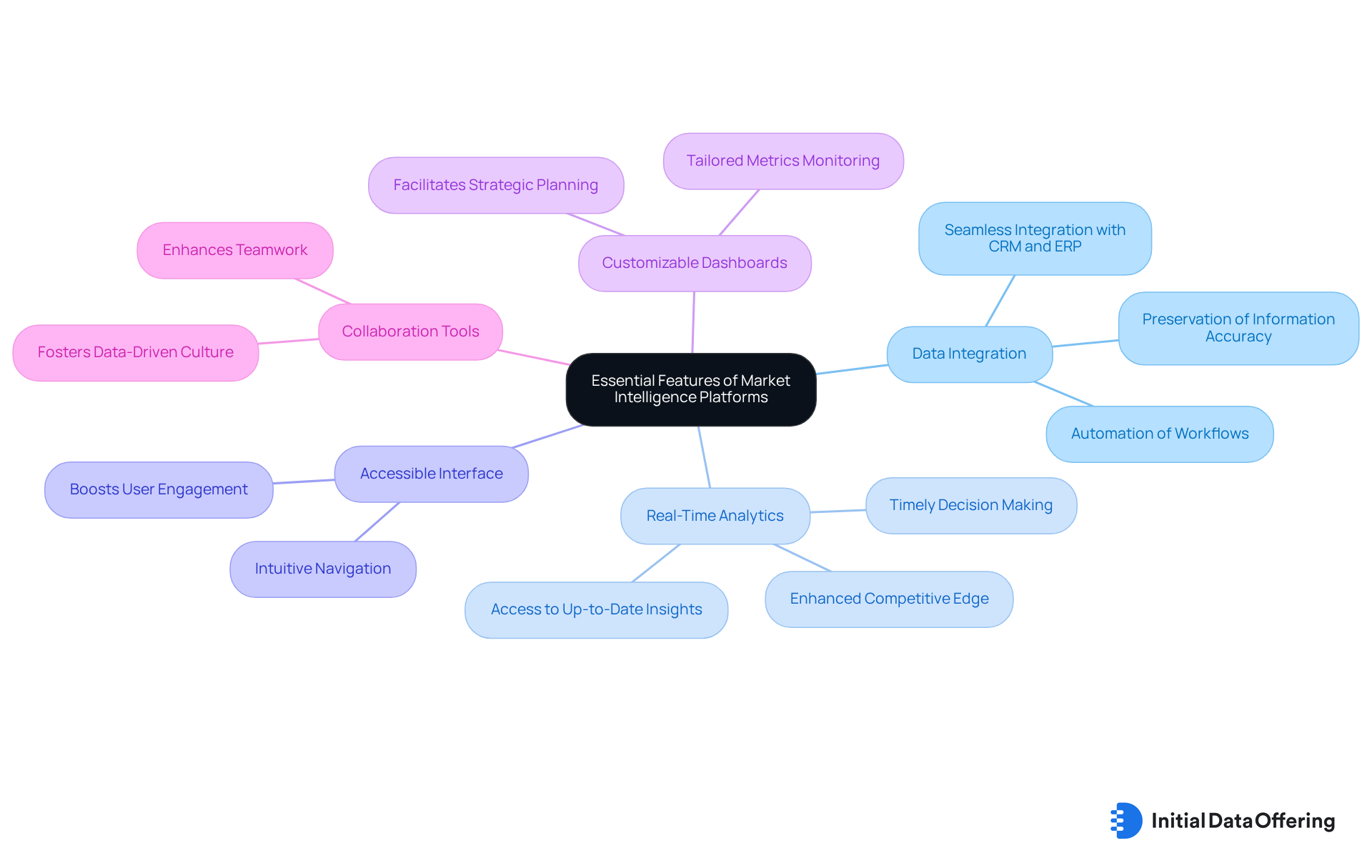
Evaluate Data Quality and Reliability
When assessing the provided by market intelligence platforms, it is crucial to evaluate these factors. Consider the following key factors:
- Accuracy: It is essential to ensure that the data accurately reflects real-world conditions. A market intelligence platform that sources information from reputable providers is more likely to deliver high-quality insights. A single erroneous data point can disrupt the entire system, leading to misguided decisions. According to Gartner, inadequate information quality costs businesses roughly $12.9 million each year, emphasizing the critical necessity for precision in information sources.
- Completeness: Verify that the datasets encompass all necessary aspects of your market. Incomplete information can distort insights, making it essential to have thorough datasets for effective analysis. High-quality information from a market intelligence platform enables organizations to make better-informed decisions and optimize operations. A Deloitte survey revealed that 67% of executives feel uneasy utilizing information from advanced analytics systems, highlighting the significance of comprehensive datasets.
- Consistency: Evaluate whether the information remains consistent over time. Unreliable information can undermine trust in the platform and lead to confusion among users. Routine evaluations and information cleansing are essential to uphold high-quality standards. As Cristian Randieri emphasizes, a market intelligence platform is built on several dimensions of information quality that serve as the foundation for effective governance of information.
- Timeliness: Data should be updated regularly to reflect the latest market trends. Platforms that offer real-time updates are preferable, as outdated information can lead to poor decision-making and potential losses. Timeliness is especially essential in fields such as logistics and finance, where choices must rely on up-to-date information.
By concentrating on these aspects, you can ensure that the system you select offers dependable data, ultimately improving your decision-making processes.
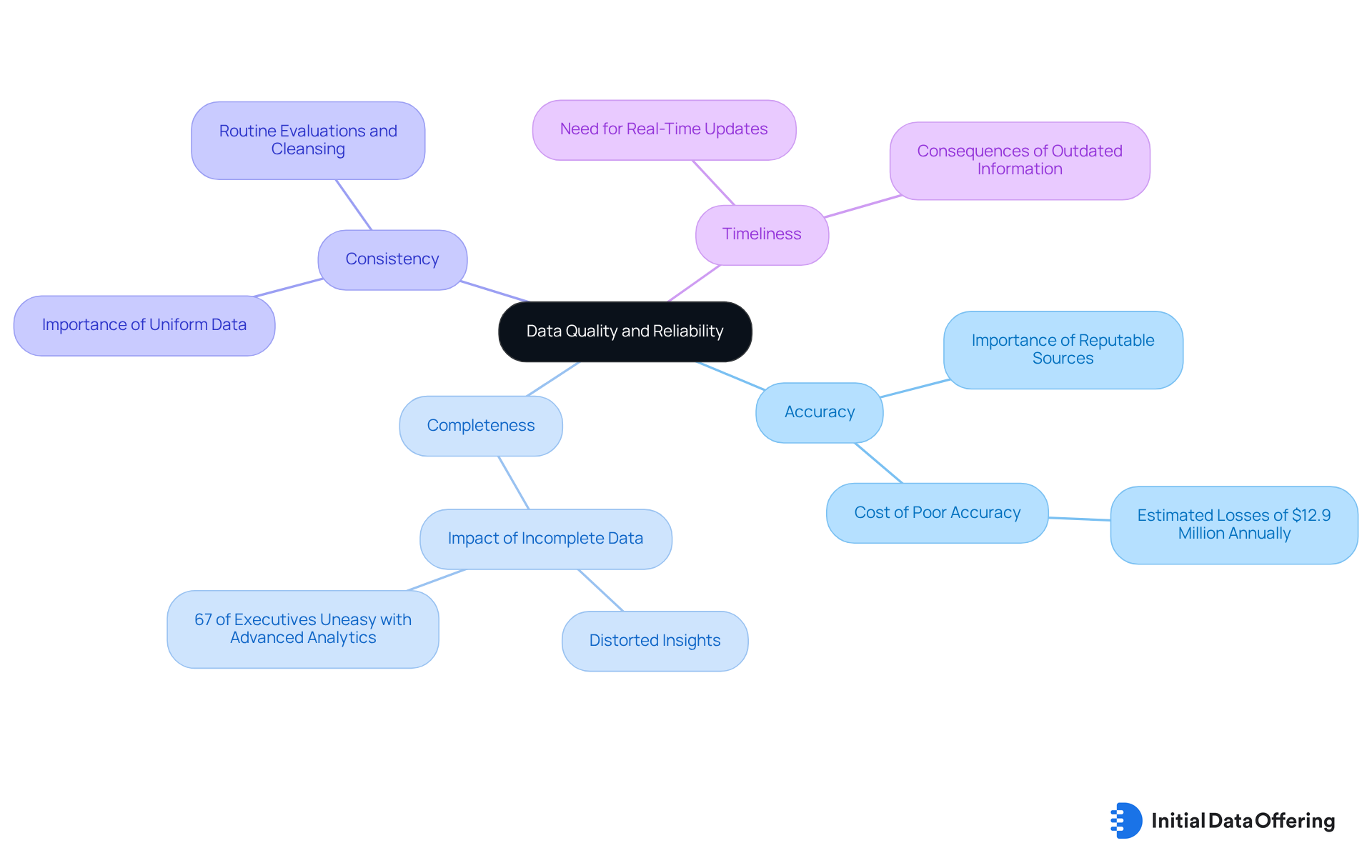
Assess Usability and Accessibility of the Platform
Assessing the usability and accessibility of a market intelligence platform is crucial for enhancing its effectiveness throughout your team. Key considerations include:
- Ease of Use: The platform's intuitiveness is paramount. A complicated interface can deter individuals, resulting in underutilization of the tool. Research indicates that 88% of online consumers are less likely to return to a site after a negative experience, underscoring the importance of a user-friendly design. Additionally, 94% of first impressions are related to a website's design, further reinforcing the significance of ease of use. Investigate whether the market intelligence platform provides comprehensive training materials, tutorials, and responsive customer support. Effective training materials are crucial for enabling individuals to navigate the system confidently, ultimately enhancing their engagement and productivity. As Pratyusha Guha observes, tackling essential usability concerns is vital for keeping individuals engaged with the market intelligence platform.
- Mobile Accessibility: Ensure that the system is optimized for mobile devices, allowing individuals to access essential insights anytime, anywhere. With 67% of individuals more likely to buy from mobile-friendly websites, this feature is becoming increasingly significant. It's essential to remember that usability should not be sacrificed for flashy features, as highlighted by Pratyusha Guha. Select systems that utilize a market intelligence platform to actively into their design and functionality. Ongoing enhancement rooted in insights from individuals can greatly improve usability. Significantly, 39% of individuals will leave a site if images take too long to load, emphasizing the necessity for websites to prioritize experience.
By concentrating on these aspects, you can greatly enhance user satisfaction and engagement with the system, ensuring that it addresses the varied needs of your team.
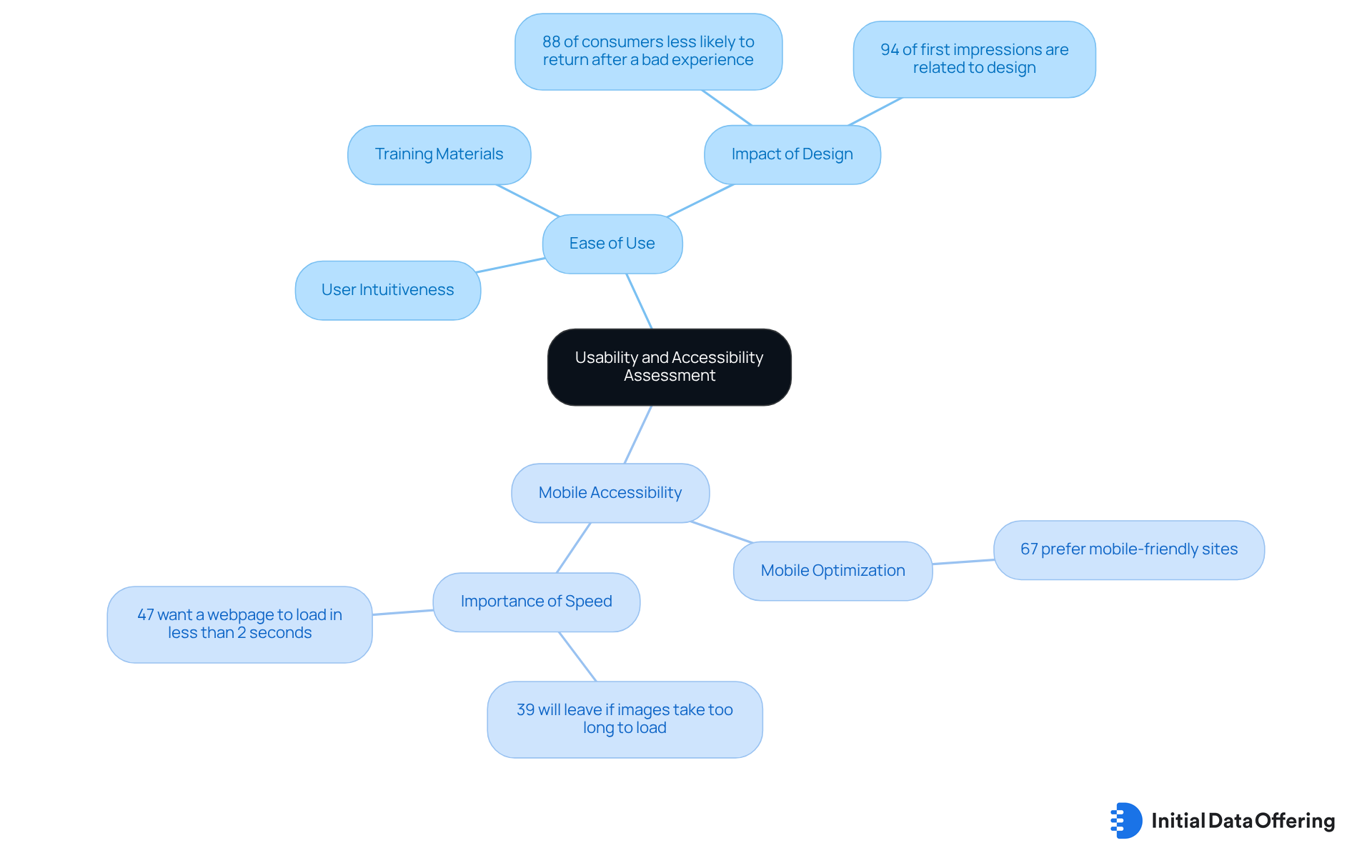
Consider Integration Capabilities with Existing Systems
When selecting a market intelligence platform, it is essential to consider its with your existing systems. This aspect is crucial for ensuring seamless operations and maximizing the value of the new platform. Here are key points to evaluate:
- Compatibility with CRM and ERP Systems: It is vital to ensure that the platform can easily connect with your current CRM and ERP systems. This compatibility streamlines data sharing, facilitating better decision-making across your organization.
- API Availability: Verify whether the system provides APIs for custom integrations. This feature enables tailored solutions that align with your specific business requirements, enhancing operational efficiency.
- Data Migration Assistance: Seek solutions that offer support for transferring existing data into the new system. This assistance is crucial to ensure that data is migrated without loss or corruption, protecting your valuable information.
- Third-Party Integrations: Evaluate the system's capability to connect with other tools you utilize, such as marketing automation software or analytics tools. This flexibility can enhance your overall data strategy and improve insights.
By ensuring robust integration capabilities, you can significantly enhance the overall functionality and efficiency of your market intelligence platform. How might these integration features improve your current processes?
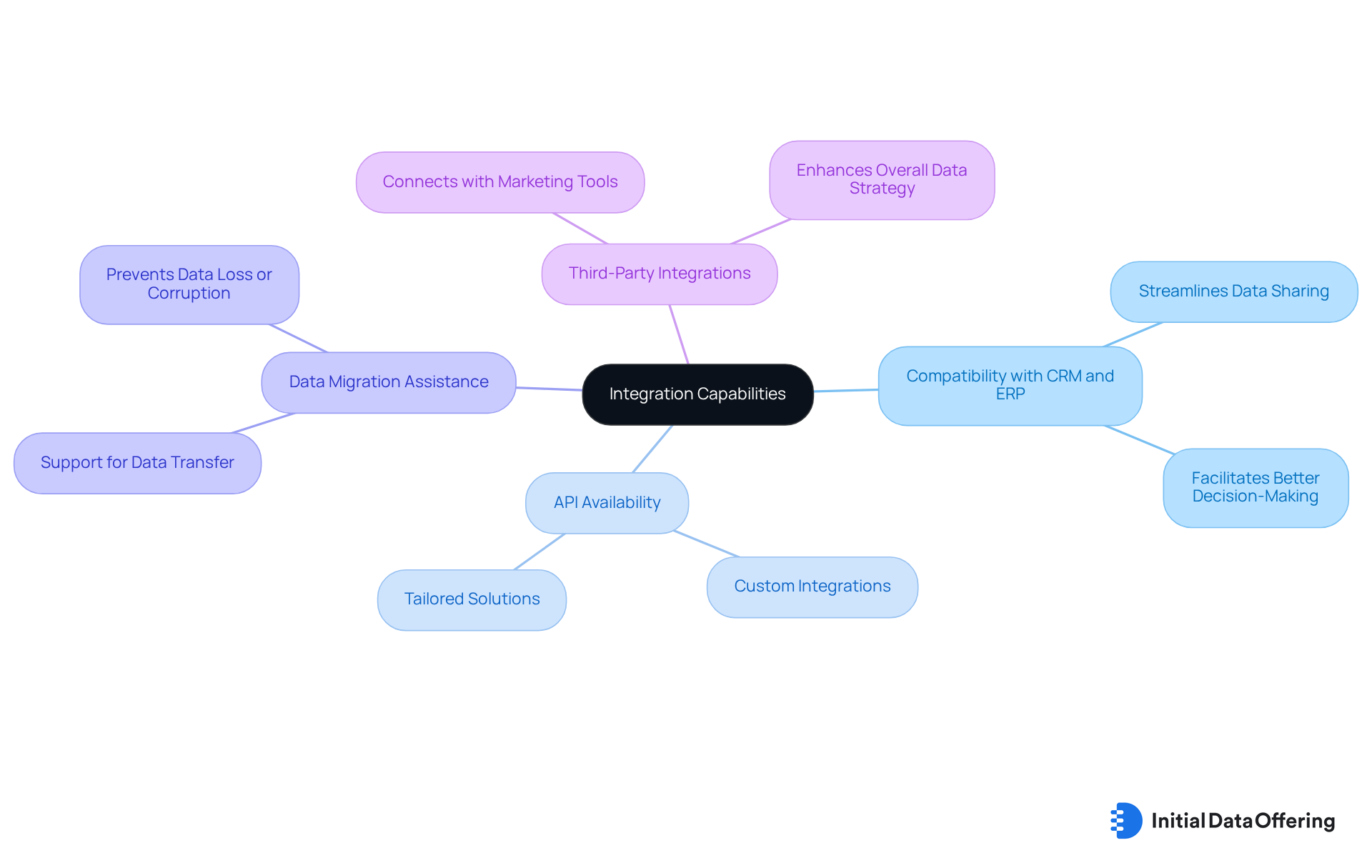
Examine Customer Support and Community Engagement
Finally, assess the customer support and community engagement elements of the market intelligence platform. Understanding these features is crucial for .
- Customer Support Availability: Look for platforms that offer 24/7 customer support through various channels, including chat, email, and phone. As Kumar stated, 'Our clients direct us, and with these systems, we’re prepared for whatever they require,' emphasizing the significance of adaptable assistance. This availability ensures that users can receive help whenever necessary, enhancing their overall experience.
- Community of Users: A robust community of participants can offer valuable insights, advice, and shared experiences that improve the utilization of the service. Interacting with other participants can result in a greater comprehension of the system's features and optimal methods, akin to how Walmart's efforts have promoted community involvement. Engaging with peers can lead to innovative solutions and shared best practices.
- Knowledge Base and Resources: Check if the system has a comprehensive knowledge base, including FAQs, tutorials, and troubleshooting guides. These resources enable individuals to address problems autonomously and enhance the platform's capabilities. A well-maintained knowledge base can significantly reduce downtime and empower users to resolve issues efficiently.
- Feedback Mechanisms: Platforms that actively seek participant feedback for improvements demonstrate a commitment to satisfaction and continuous enhancement. This responsiveness can lead to a more tailored and effective user experience, as seen in Walmart's Enhanced Customer Support Assistant, which has improved customer interactions significantly. Such mechanisms not only foster user engagement but also drive ongoing improvements to the service.
By prioritizing customer support and community engagement, you can ensure that you have the resources needed to maximize the value of your market intelligence platform, which ultimately drives better decision-making and strategic insights.
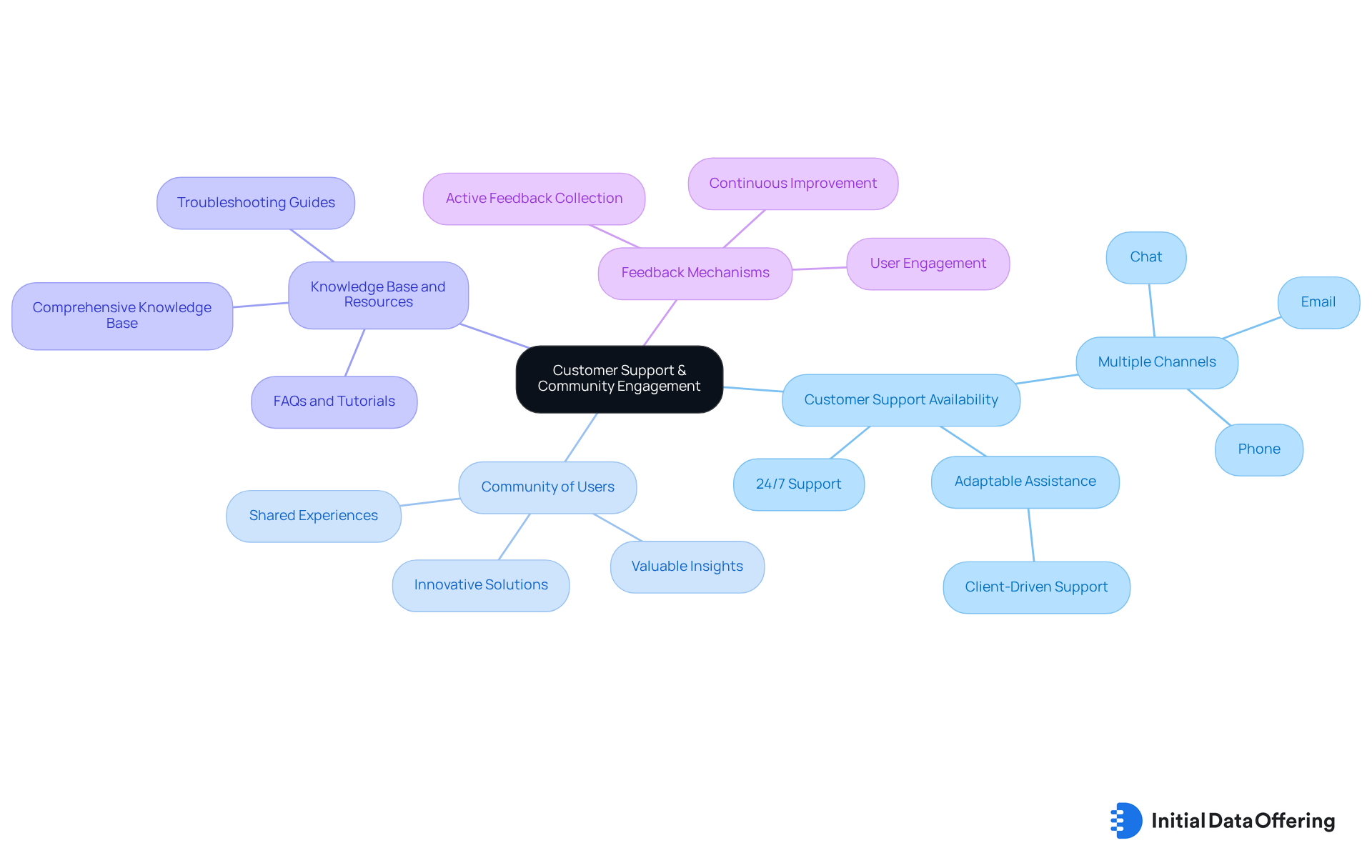
Conclusion
Selecting the right market intelligence platform is a critical step for any organization aiming to enhance its decision-making capabilities and maintain a competitive edge. Understanding essential features, assessing data quality, ensuring usability and accessibility, evaluating integration capabilities, and examining customer support are crucial in making informed choices that align with strategic objectives.
Key arguments presented in this guide emphasize the importance of features such as:
- Data integration
- Real-time analytics
- Customizable dashboards
These elements collectively foster a data-driven culture within organizations. Moreover, the significance of data quality—encompassing accuracy, completeness, consistency, and timeliness—cannot be overstated, as it directly impacts the reliability of insights derived from these platforms. Usability and accessibility not only enhance user engagement but also facilitate smoother interactions. Robust integration capabilities streamline operations and maximize value, while strong customer support and community engagement empower users and drive continuous improvement.
Ultimately, the selection of a market intelligence platform should not be taken lightly. It is essential to prioritize the features and capabilities that best serve the unique needs of the organization. As businesses navigate an increasingly data-driven landscape, leveraging the right tools will facilitate better decision-making and position them for sustained growth and success. How can your organization embrace the opportunity to enhance operational efficiency and strategic insights? Choosing a market intelligence solution that aligns with your goals is a pivotal step towards achieving these objectives.
Frequently Asked Questions
What are the essential features to consider when selecting a market intelligence platform?
Key features to consider include data integration with existing systems, real-time analytics, an accessible interface, customizable dashboards, and collaboration tools.
Why is data integration important in a market intelligence platform?
Data integration ensures a smooth flow of information across the organization, preserving accuracy and consistency, which are foundational for effective decision-making.
How does real-time analytics benefit businesses using market intelligence platforms?
Real-time analytics enables timely decision-making by providing up-to-date insights, allowing organizations to respond quickly to market changes and trends.
What role does an accessible interface play in a market intelligence platform?
An intuitive interface boosts user adoption and operational efficiency, making it easier for users to navigate the system and engage with the information.
Why are customizable dashboards important in market intelligence platforms?
Customizable dashboards allow users to focus on specific metrics, facilitating better insights and strategic planning tailored to their needs.
How do collaboration tools enhance the functionality of market intelligence platforms?
Collaboration tools facilitate teamwork and sharing of insights among team members, which can significantly boost productivity and foster a data-driven culture.
What factors should be evaluated to ensure data quality and reliability in market intelligence platforms?
Key factors include accuracy, completeness, consistency, and timeliness of the data provided by the platform.
Why is accuracy crucial in market intelligence data?
Accurate data reflects real-world conditions and is essential for making informed decisions; erroneous data can lead to misguided choices.
How does completeness of datasets affect market intelligence insights?
Incomplete datasets can distort insights, making it essential to have thorough information for effective analysis and decision-making.
What is the significance of consistency in information from market intelligence platforms?
Consistent information builds trust in the platform and helps avoid confusion among users; routine evaluations are necessary to maintain high-quality standards.
Why is timeliness important for data in market intelligence platforms?
Data should be updated regularly to reflect the latest trends, as outdated information can lead to poor decision-making and potential losses, particularly in fields like logistics and finance.